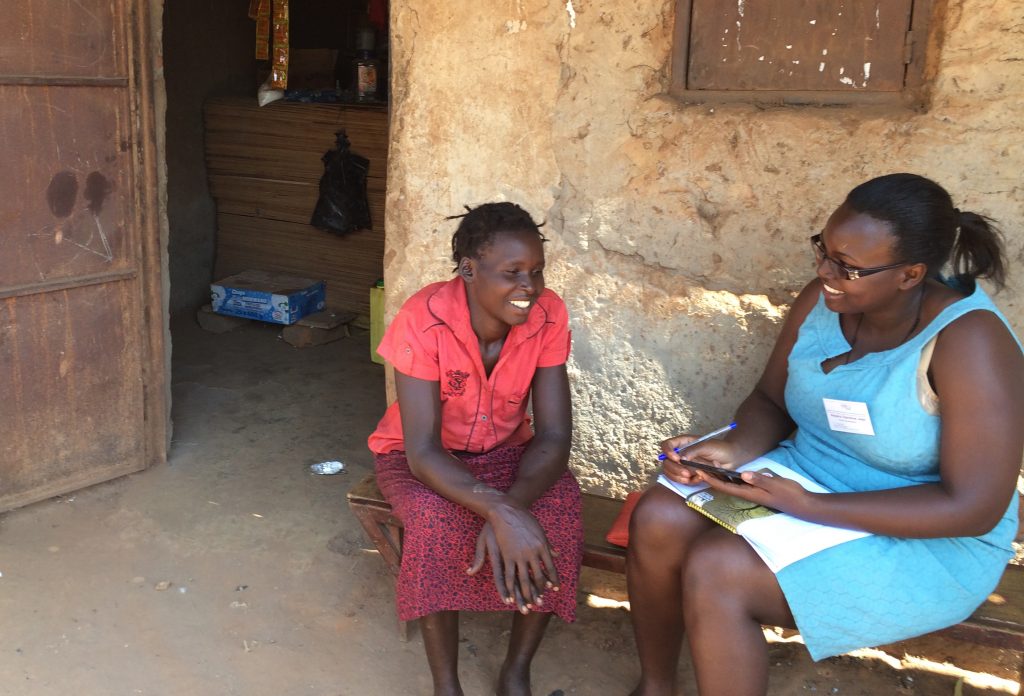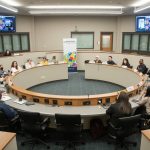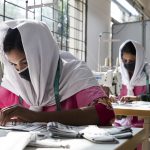In the era of social distancing, travel restrictions, and stay-at-home orders, face-to-face research has been halted globally. One thing is clear: because of the high person-to-person infection patterns of COVID-19, sending out teams of researchers to contact and interact with hundreds of vulnerable individuals across communities and geographies poses a serious public health risk to both data collectors and to the communities in which they work. Moreover, there is a high likelihood of mistrust of outsiders within communities under threat of COVID-19, ensuring that success of continued face-to-face research efforts is not guaranteed.
In light of this new reality, our days have been busy creating contingency plans for our funded research, attempting to answer questions like: When will it be safe to return to normal? But it’s hard to predict when, how, or if things will be “normal” again.
In the context of a global pandemic, we ask: does our research still keep people safe?
In our work at the Keough School of Global Affairs, we encounter the most vulnerable populations in some of the world’s most vulnerable countries, conducting our research through a lens of integral human development. We have a responsibility to many important stakeholders—for example, we have an obligation to funders and the academic community to answer the questions we set out to answer.
But we have an equally important obligation to the people we employ (i.e., research assistants, data collection firms, enumerators, facilitators, assessors, consultants) and the beneficiaries we hope to make contact with (e.g., households, students, farmers, service providers). The health and safety of these groups is always the primary consideration when engaging in field-based research. But in the context of a global pandemic, we need to ask ourselves: Does our research still keep these parties safe?
Costs may be even greater if we lift restrictions too soon and in a way that does not prioritize public health.
In many countries, guidance from leadership is unclear and confusing. In our own communities, we wonder how to access a test if we need one. Should we trust the statistics on cases and deaths or are they underestimated? When will it be safe to resume normal activities?
In many communities, public health has been pitted against economic and social growth, and has therefore become highly politicized and emotionally charged. We know there are social, economic, and political pressures to resume normal activities sooner rather than later. We recognize there are significant human and financial costs to the current restrictions on our mobility and proximity, but we also know that these costs may be even greater if we lift them too soon and in a way that does not prioritize public health.
Delays to care
These concerns are amplified in countries with more vulnerable populations and fragile health systems. In these environments, the three delays model sheds light on the significant barriers to care for people affected by COVID-19. The first delay to care lies in the decision to seek care. In the absence of wide-scale testing, individuals might not know they are carriers of the disease. Individuals might also lack trust in the health system or lack adequate knowledge about health issues, preventing them from making the decision to seek out care.
The second delay regards access to health care. If the resources are unavailable to physically reach a health care facility or to pay for care once there, then care might not be sought, even if it’s desired. In many vulnerable contexts in which we work, we have witnessed a number of barriers to access, including language barriers between indigenous communities and the health care facilities meant to serve them, large distances to health facilities, high costs of care, and lack of transportation options.
Finally, even if these two barriers are overcome, there exists a third barrier: the quality of the care itself once it is accessed. Quality care depends upon the adequate functioning of the various components of the health system, including a functional supply chain to ensure the goods, medications, and supplies are available when they are needed; appropriate equipment is available, such as ventilators in the case of COVID-19; that the medical staff have the appropriate training, skills, knowledge, and resources to perform their jobs effectively; that the facilities are clean and well-maintained; and that care provided is dignity-affirming. In many places in which we work, including within our own countries, these three delays are evident and prevent appropriate care, and COVID-19 will only compound these issues.
In this changing environment, how do we make timely decisions that honor our commitment to the communities we hope to serve?
As international researchers, we have an obligation to protect those whom we hope to serve—both the local research teams we employ, and the communities whom we hope our research will benefit. Governments and universities may not be issuing clear guidelines around whether the in person research is permitted. For example, in Mexico, door-to-door data collection by the National Institute of Statistics and Geography continued well into the crisis because the Mexican government had not declared enumerators to be non-essential workers. Such steps may have needlessly endangered millions of people. In this changing environment, how do we ensure we make timely decisions that honor our commitment to the communities we hope to serve?
Research examples from the Keough School
At the Ford Program in Human Development Studies and Solidarity and the Pulte Institute for Global Development, we have pivoted our own research endeavors to adjust to this rapidly changing situation. In some cases we are halting research, but in other cases we have been able to pivot either research design or data collection modality to continue our work.
In Kenya, a Ford Program research project focused on the impact of mentoring on female-headed small businesses was already underway when the pandemic spread to the country. In partnership with Notre Dame economist Wyatt Brooks, the research team pivoted to study the effectiveness of various interventions such as mobile cash transfers to entrepreneurs whose livelihoods may be harmed by the COVID-19 pandemic. The research team is collecting data remotely so that the research is respectful of social distancing directives.
In Uganda, the Pulte Institute is conducting research on USAID’s self-reliance learning agenda. We are working with the NGO Just Like My Child, who will conduct phone interviews with the beneficiaries to understand people’s commitments on health and education through a gender lens. Having interviews conducted by NGO staff, instead of US-based researchers, help ease the language barriers while maintaining social distancing requirements.
Recommended considerations
These examples demonstrate the considerations we need to make on continuing, pivoting, pausing, and eventually resuming field-based research activities. We need to ask ourselves specific questions such as: How has COVID-19 affected your research questions and research design? Is your current design still relevant, and if not, how should it be adjusted? What other methods could we use to get the data we need? Could you get similar information from secondary sources, crowdsourced data, or phone interviews?
When to return
Specifically on the question of when to return, another set of questions arise. Does your institution’s ethical review board allow in-person research? If the country where research is taking place has an ethical review board, is this board approving face-to-face data collection? Even if travel can be resumed, such guidelines may be more or less trustworthy depending on the strength of their own health systems.
Consider the local context in terms of safety, trust and willingness to welcome outsiders.
Other important questions to ask: Are governmental guidelines informed by public health experts? What is the current state of the epidemic within the given context? Is infection increasing? What is the capacity of the health system within the country? Finally, field-based work may be focused in one region or area of a country, so it’s important to consider the local context in terms of safety, trust and willingness to welcome outsiders. How do local communities feel about allowing research and researchers in their contexts?
When the decision is made to return to the field, it’s imperative to protect interviewers, respondents, and the general population by developing standard operating procedures which put the health and safety of the community first. Researchers could consider the following at that point: What adjustments could you make to your research design that minimizes risk? What safety measures should be in place to protect the enumeration team during training? What safety measures should be put in place during data collection, to protect the data collection team, the respondents, and the larger community?
Conclusion
Community-based research is especially important in these difficult times, but it is also more difficult than ever. As researchers in the Keough School, we aim to encounter the communities we serve, to accompany them in times of distress, and to respect their dignity and right to a healthy life. It’s imperative that we consider the risks when thinking about how we can continue, pivot, pause, and eventually resume field-based research activities.
Viewing our work through the lens of integral human development can help us to prioritize the dignity and well-being of those with whom we interact at all stages of our fieldwork, from the field-based teams to the individuals participating in the research, and even the larger community where the research is taking place. We urge our larger community of researchers to make the same considerations.
Danice Brown Guzmán is a research associate within the Pulte Institute for Global Development’s Evidence and Learning Division and the monitoring and evaluation specialist at the Kellogg Institute’s Ford Program in Human Development Studies. Her research interests include food security in the Middle East and complex network analysis.
Rev. Robert A. Dowd, C.S.C. is associate professor of political science, a concurrent associate professor in the Keough School of Global Affairs and director of the Kellogg Institute’s Ford Program in Human Development Studies and Solidarity.
Lila Kumar Khatiwada is a senior research associate within the Pulte Institute for Global Development’s Evidence and Learning Division. His research interests include rural sociology and development; microfinance; agricultural development; infrastructure development; and water, sanitation, and hygiene (WASH).
Paul Perrin leads the Pulte Institute’s Evidence and Learning Division and is an international health, humanitarian, and development research and practice professional with over a decade of work experience in academic, government, and non-governmental settings.
Estela Rivero is a research associate within the Pulte Institute for Global Development’s Evidence and Learning Division. She is a social demographer by trade who specializes in the formulation and implementation of research studies aimed at improving social interventions and programs.
This article is the eighth in a series of blog posts published by the Keough School of Global Affairs. Dignity and Development provides in-depth analysis of global challenges through the lens of integral human development.



